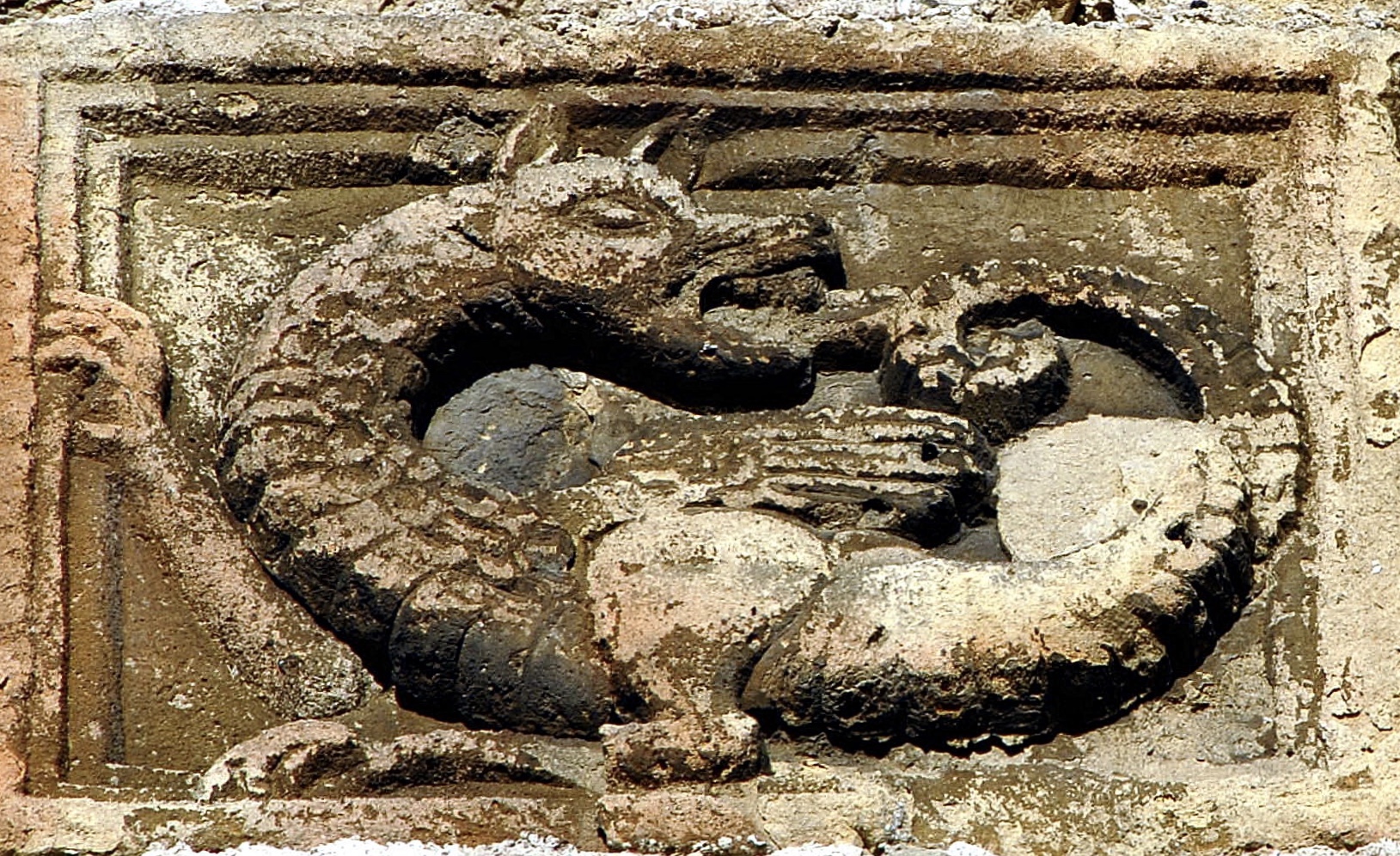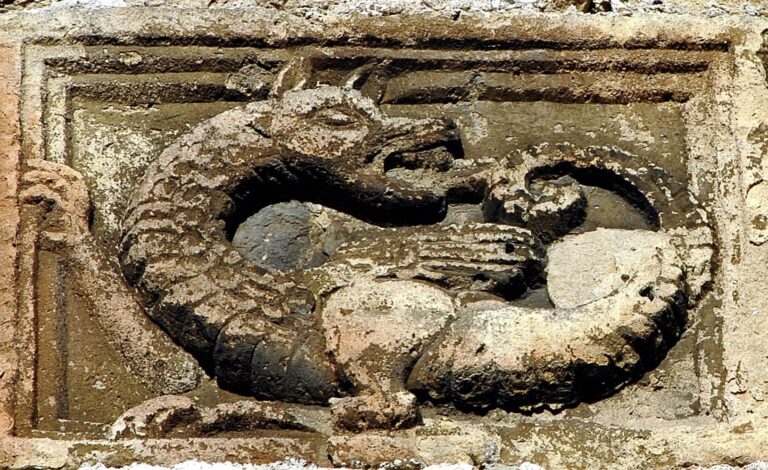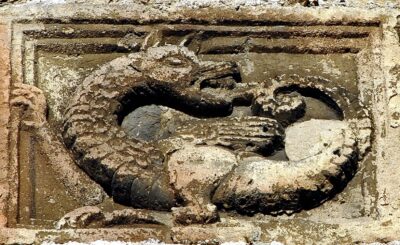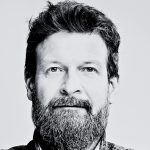There’s a large tattoo on Mateusz Piskorski’s body, a remainder of his nationalist past: it depicts a snake eating its own tail. For the past years, Piskorski has been Russia’s most important man in Poland – and he has been active in the zone of soft influence for years. Now he’s under arrest, due to accusations of espionage.
Szczecin is the largest harbor city of north-western Poland, located just near the German border, and a special place on the map of Russian influence in Poland. The city is a common denominator for some people accused of giving way to Russian influence – a politician from Ruch Narodowy (the National Movement) Sylwester Chruszcz, and former Deputy Minister of Defense Jacek Kotas, as well as for those who had to face charges of espionage for Russia: Stanisław Szypowski (already convicted) and Mateusz Piskorski (still under arrest and waiting for indictment). Even tough the city is far away from the decision-making bodies, it has always been an important place (for the Warsaw Pact, Szczecin was where the invasion on Denmark was to be launched from in the future war). During Communism, Szczecin was home to consulates of Finland, GDR, Cuba and USSR (and later – Russia).
Mateusz Piskorski was born in 1977. In one of his interviews he stated that as a child he hated Szczecin and the people who surrounded him when he was growing up.
In his youth, Piskorski showed interest in nationalist movements; he was an active member of a fascist-nationalist formation Niklot. Piskorski was also fascinated by neo-pagan movements and the idea of Pan-Slavism. He became a co-editor of the Odala magazine that encouraged race war, and also wrote his own articles; his name appears in various niche magazines. Over the course of the whole 90’s, Piskorski published his articles in magazines that glorified racism, such as Salute and Wadera (the front cover of Wadera featured the Ku-Klux-Klan symbol).
Piskorski got noticed for the first time in 2000 – he appeared on the cover of a weekly magazine Wprost. The picture shows a group of Odala members, captioned „Hitlerjugend”. Mateusz Piskorski is standing next to Niklot leader, Tomasz Szczepański. The members of Odala around them are holding their hands up in a Nazi salute. The movement attracted a lot of attention of an anti-fascist and anti-racist organization Nigdy Więcej (Never Again).
In the 90’s, the group that gathered around Odala magazine (which no longer exists) named itself National Socialists for a while. In Szczecin, it was famous for organizing street protests, which were fairly small in size and scope, but never failed to attract a lot of media attention. One of such events was a protest against celebrating Valentine’s Day, as the group considered it in opposition to Polish „origin and heritage”. Niklot was a more serious organization: it consecutively joined the structures of various political parties: Partia Narodowa (the National Party), Liga Polskich Rodzin (the League of Polish Families) and Polskie Stronnictwo Ludowe (the Polish People’s Party).
Piskorski joined a minor political party Unia Społeczno-Narodowa (the Socio-National Union). Together with Sylwester Chruszcz – who back then was a Młodzież Wszechpolska (All-Polish Youth) politician, and today is an MP for Ruch Narodowy (the National Movement) – Piskorski organized a celebration in Szczecin to commemorate the 15th anniversary of December 1981, when the authoritarian government introduced martial law in Poland.
A few years later, in 2000, Mateusz Piskorski was already a member of a real political party – the Polish People’s Party. However, his cover photo in Wprost put an end to Piskorski’s career in the party. He had to go. After two years he found a new harbor in the structures of a new party – Samoobrona (Self-Defense of the Republic of Poland). With the party’s support, he soon ran for a seat in Szczecin’s city council.
In 2002, a weekly magazine Newsweek Polska wrote about the new far-right members of Samoobrona:
Another exotic element of the Polish political stage are the members of the Association for Tradition and Culture Niklot which has pledged to fight against such ideas as „mixing of cultures, languages, nations and races”. Niklot activists – Igor Górewicz, Mateusz Piskorski and Marcin Martynowski – are members of the Szczecin division of Samoobrona and are running for city council positions. ‘I am a traditionalist and a nationalist,’ said Piskorski in an interview.
The interest in Piskorski was also growing due to information that he had a Nazi symbol tattooed on his body (Piskorski himself claims the tattoo depicts Ouroboros – a snake eating its own tail).
In 2005, Mateusz Piskorski became, albeit not with many votes (5600) a Samoobrona MP in the Polish Parliament. He moved from his local backyard all the way to Warsaw. Piskorski is educated, well-read and speaks foreign languages – he soon became an advisor to Samoobrona’s leader, Andrzej Lepper. From 2005 to 2007 Samoobrona formed a coalition together with Prawo i Sprawiedliwość (Law and Justice) and Liga Polskich Rodzin, and this way it became part of the ruling power in Poland. Andrzej Lepper became the Minister of Agriculture. Piskorski officially left Niklot. His transfer to big politics became a milestone; even though almost every newspaper that wrote about Piskorski would remind of his flirt with fascist organizations, he would soon gain fame for another reason – the controversies around his activities on international stage.
The first time he provoked an outrage was even before he became an MP – in October 2004 Andrzej Lepper sent Piskorski to Belarus as an election observer. „There were no errors or irregularities to be found in the election process,” wrote Piskorski on Samoobrona’s website.
In December 2005 Piskorski – already a Samoobrona MP – went to self-appointed Republic of Transnistria, created thanks to Moscow’s support. Piskorski went there to monitor the elections for the Supreme Council of the Republic. He claimed the elections were more democratic than those held in Poland, and promised to do all he could to make Poland approve Transnistria’s independence. This proclamation from a Polish MP took the media in Transnistria and in Russia by storm. A scandal erupted. Piskorski explained that he was misquoted.
His career in the Parliament was cut short by preliminary parliamentary elections in 2007. Even though he ran in the elections, he failed to get reelected. In 2009 he helped to create an anti-EU political party Libertas Polska, afterwards engaging in a short cooperation with Polska Partia Pracy (the Polish Labor Party) – in 2011 he ran for a seat in Parliament as a member of this party, with no success again. Eventually Piskorski came back to Samoobrona and became the party’s deputy leader.
The end of political career became the beginning of new activities: Piskorski established the European Center for Geopolitical Analysis (ECAG) – the center is officially a think-tank working on political analysis, expert consulting and book publishing. ECAG is known for its interest in the Eastern countries as well as for its friendly attitude towards Vladimir Putin and the president of Belarus, Alexander Lukashenko. ECAG often invites Polish journalists for trips to Belarus and other Eastern countries.
In 2012 ECAG organized a trip for Polish journalists to Syria. The offer reached various papers and magazines, one of them being Newsweek. The journalists were tempted with a chance of an exclusive interview with president Bashar al-Assad.
„When we asked to see the trip program, it turned out to be a propaganda setup: the journalists were supposed to take part in an international conference on counter-measuring the defamation of Syrian authorities and to give interviews to the regime media. We declined to take part in this expedition, but decided to see what’s hiding behind the veneer of the European Center for Geopolitical Analysis,” wrote Newsweek in early 2013.
Newsweek was the first to reveal the connection between ECAG and Alexey Kochetkov, the leader of a Russian organization CIS-EMO which happens to appear wherever Russia is fighting over its interests: Transnistria, Abkhazia, South Ossetia. CIS-EMO reports are always in line with Kremlin’s stance on all matters.
During that meantime, Piskorski’s organization maintained a relationship with the Russian Institute of the Newly Established States, which was connected to Vladimir Putin’s former advisor, Modest Kolerov. Kolerov, a historian from Russia, has been since 2002 a president of a pro-Kremlin REGNUM News Agency. Due to his comments on the agency’s website, Kolerov is considered persona non grata in Latvia, Lithuania, Georgia and Estonia.
„Occupation of the Baltic states is not currently on the list of Russia’s interests. But should it become an advisable step, there is no formal obstacles to proceed,” wrote Kolerov on REGNUM website.
Those connections and ECAG activities gradually raised some voices calling Mateusz Piskorski an „influence agent”. Former politician’s activities became a matter of interest for the Internal Security Agency. When „Newsweek” published information about it, ECAG members announced on their website that the organization was going through a „self-backgroud check” – they issued a formal request to the Internal Security Agency for confirmation whether there was any ongoing investigation against ECAG. The official answer from ISA was vague and instantly made public by ECAG, and Piskorski sued the magazine.
‘There is no such thing as political debate right now, it’s a sewer. If there was any chance for an actual debate, we could discuss various political concepts, exchange arguments and try to convince each other instead of throwing accusations of espionage. Sadly, Polish justice system works very slowly, but I intend to file suits one by one whenever I see any articles smearing my good name. It’s the only way out,’ said Piskorski in an interview for Wirtualna Polska.
Since the eruption of conflict in Ukraine, Piskorski became a frequent guest of the pro-Kremlin, English speaking news channel Russia Today. He appeared there as an expert and suggested that the protests in Kiev’s Maidan were steered and funded by outside powers.
‘I appear on Russian television not as a politician but as an expert. I hold a degree in political science, and since 2007 I have been professionally active as an analyst and expert. They invite me so I give interviews or make comments, I show up in various programs. I appear not only in the Russian media but also in those from Belarus or Azerbaijan. I see nothing wrong with that,’ explained Piskorski to Wirtualna Polska.
During the referendum in Crimea he was the leader of an international commission supposed to monitor it. ‘What we have seen in Crimea today is no different from a referendum held in any democratic European country,’ said Piskorski just after the voting ended. He was later quoted by a Russian news agency ITAR-TASS.
He also went to monitor rigged elections of self-appointed government made of pro-Russian separatists in Eastern Ukraine.
„After having visited electoral committees in a few different regions I can say with all responsibility that the new political formula, that is the Donetsk People’s Republic, means a great hope for stable development for the local people,” wrote Piskorski on his blog after returning to Poland.
He launched an attack on journalists from the U.S. and Ukraine in a debate aired by Channel 1 of Russian Television:
‘With all due respect, I would suggest that the experts should start telling the truth. Ukraine is currently under a neo-Nazi regime. You know it all too well. If your German government, your own chancellor, quoted Adolph Hitler, you would call it a neo-Nazi regime. Current president of Ukraine is referring directly to Stepan Bandera. Do you know who was Bandera? They quote him, call him a hero. You should follow information coming from Ukraine more attentively.’
Piskorski insisted that it was difficult to comment on those subjects when one knew the problem only from the media: ‘Unfortunately, most experts an politicians who speak on the media have never been to Donbas or Syria. And in order to fully understand the situation one must hear out both sides,’ Piskorski added in the interview for Wirtualna Polska.
In 2015, Piskorski established Zmiana (Change) Party. He claimed that Poland was under NATO occupation and independent Ukraine was a „Bandera mutant”. Zmiana openly supported Vladimir Putin. It made its headquarters in Warsaw, in a building that was built and owned by the Polish-Soviet Friendship Society.
From its launch, the organization has had an obviously pro-Russian nature. The new party attracted people from both radical left and radical right. What brought them together was their dislike of the USA (in the party’s program declaration, the U.S. is referred to as a dying American hegemony) that „the Polish governments served to”.
Konrad Rękas – a journalist, right-wing politician and a member of the local government – became one of deputy leaders of Zmiana. In 2014 he wrote an article suggesting that investing in the gas terminal in Świnoujście would make Poland dependent on an expensive gas provider. According to the Internal Security Agency, Rękas was allegedly encouraged to write the article by a person accused of Russian espionage. Konrad Rękas sued ISA over the allegation in the fast-track (election) court mode. The court dismissed the application.
Bartosz Bekier, a student of political sciences at Cardinal Stefan Wyszyński University in Warsaw, became another deputy leader of Zmiana. Bekier has also been a member of the editorial team of xportal.pl and a leader of a radical-nationalist organization Falanga. Formerly connected to All-Polish Youth and the National Radical Camp (he was even a leader of the Masovian Brigade of the National Radical Camp).
„In his perspective, Vladimir Putin is an appropriate nation leader who supports traditional values, does not allow gay parades and won’t kneel before the USA,” wrote lenta.ru, describing Bekier. According to the website, Bekier organizes pro-Russia rallies in Warsaw, goes to front lines to support the separatists in their fight against Ukrainian armies, and is a „living proof that there are Putin’s supporters in Poland, too.”
People gathered around Piskorski traveled to Syria where they met government representatives; they also visited Hezbollah base in Liban. One of Zmiana’s deputy leaders is Nabil Al-Malazi, born in Syria and living in Poland since mid-70s, an engineer and businessman. Al-Malazi is also an associate of ECAG. In his opinion the conflict in Syria was provoked by the U.S., Israel, Qatar, Saudi Arabia and Turkey.
In 2015, Zmiana’s party congress was supposed to host „guests from Novorossia” – the Minister of Foreign Affairs of the Donetsk People’s Republic Alexander Kofman, and the leader of the Union of Poles in Belarus, Mieczysław Łysy. However, the guests were not allowed to cross the Polish border. Instead, Kofman sent greetings to „friends from Poland” – the video of his speech was shown during the congress.
Mateusz Piskorski is also close to Janusz Korwin-Mikke. In 2014 (before Korwin-Mikke became an MEP) the politician claimed to have a friendly opinion on Vladimir Putin. Kremlin invited Korwin-Mikke to a conference in Yalta, also called by them as the „anti-fascist Maidan”, attended by the rebels from self-anointed Donetsk People’s Republic. Conference subject: „Should the terrorist offensive in Donetsk and Luhansk expand to other parts of Ukraine?”. Korwin didn’t make it. He received his invitation from Mateusz Piskorski.
In December 2014, Piskorski and Korwin-Mikke went to Syria for a conference on „fighting terrorism and religious extremism”. Photos showing them together at the conference surfaced in Poland a few months later.
In October 2016, Janusz Korwin-Mikke (also known in Poland as JKM), already an MEP, traveled around Russia with members of Zmiana Party and praised Putin. He set up a Facebook profile in Russian, and another one on a Russian social media platform, VKontakte.
Warsaw, 18 May 2016. In Poland, Zmiana party was already long referred to as „Kremlin’s 5th column”. Mateusz Piskorski was about to fly to Moscow. The Internal Security Agency officials stopped him on the street. On the same morning ISA entered Zmiana’s office and the flats of Piskorski’s associates. They searched for hidden money and documents written in Cyrillic. They confiscated computers and a bottle of Russian vodka. In Cracow ISA searched flats of two politicians connected to Korwin, in relation to the same case.
Piskorski was accused of espionage: he is thought to have cooperated with Russian intel, accepted operational tasks, promoted Russian interests in Poland and manipulated society’s attitudes. He is still under arrest.
A few weeks after Piskorski’s arrest, JKM gave and interview to a Russian propaganda radio Sputnik.
‘I approve Mr. Putin’s policy, although not in all aspects. I have never supported the Donbass invasion. But it’s not a reason to arrest a man, just because he supports someone who is not liked by our president and prime minister. Anyway, I suspect that Mr. Piskorski was only locked up because of the upcoming NATO summit to make sure he doesn’t run some demonstration, and he’ll probably be set free once the summit is over.’ The NATO summit took place in July of 2016, Piskorski still remains arrested.
Mateusz Piskorski is one of the people appearing in the Latvian documentary Masterplan about informal Russian influences. The scriptwriter Sanita Jemberga believes Piskorski was valuable for the Russian – but not as a spy but as an influence agent; someone who gathers people with anti-Western views and unites them in a group.
A translator Marcin Rey has been describing Russian influence in Polish politics for the past eighteen months. He has created a Facebook page called „Russia’s 5th Column in Poland”. In Rey’s opinion, Russians view some of pro-Russian initiatives as some kind of startups.
‘It often occurs without direct inspiration. Someone happens to support Kremlin’s politics, it’s their personal view. This is even better for Russia, because such actions are spontaneous. Those initiatives are like self-seeding plants. And here’s the thing with startups: sooner or later a big investor will come and buy all the assets. Korwin? I don’t think he’s receiving any money from Moscow. But his work is fuel for Russian propaganda. He does not decline to cooperate with Russian institutions whenever he takes part in propaganda trips, organized by Kremlin’s official Volodymyr Bondarenko in occupied Crimea or in Chechnya.’
Mateusz Piskorski has been in custody for over a year. Until January 2017 he ran a blog from the custody. In his last entry on 20th of January he congratulated Donald Trump on winning the US presidential elections.
The European Court of Human Rights has recently rejected the complaint of Piskorski’s defenders on extensive period of detention.
Co-founder and editor-in-chief at FRONTSTORY.PL, Wojciech Cieśla is an award-winning Polish journalist who, since 2016, has worked with Investigate Europe. He is the co-founder and chairman of Fundacja Reporterów (Reporters Foundation). He is based in Warsaw.







